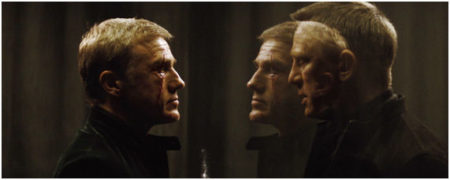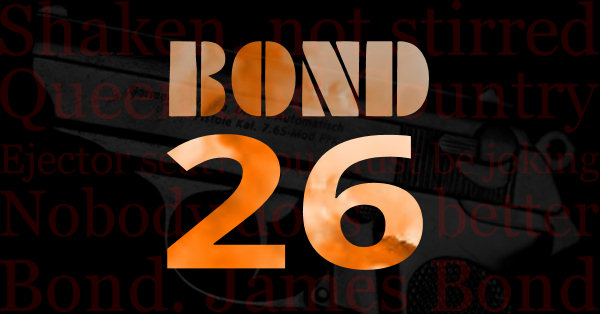Guest writer Nicolás Suszczyk revisits SPECTRE and looks at the relationship between 007 and a rebooted Blofeld.

Blofeld confronts James Bond in SPECTRE.
More than a year has passed since SPECTRE, the latest James Bond film, was released. To many people it was fantastic; tough to some others it was rather disappointing. Bond fans didn’t reach the consensus of – let’s say – GoldenEye, Casino Royale or Skyfall as a whole. Let me tell you that I am among the first group (minority or majority) that considers SPECTRE is probably one of the most enjoyable, entertaining and brilliantly made Bond films since The World is not Enough (without recognizing how great Casino Royale was).
I’m peacefully walking to the battlefield here to defend (and by “defend” I don’t really mean “applaud”) one of the most criticized aspects of the film’s plot, which is the villain, Bond’s foster brother, revealed as Ernst Stavro Blofeld after the first two thirds of the movie.
First of all, I’ll admit that – being young, part of the so called “GoldenEye generation” – I was one of the most conservatives Bond fans around there. I didn’t like that Casino Royale meant a reboot of the whole saga or having Q being younger than Bond in Skyfall.
Yet, I have to say I didn’t feel particularly bothered to the fact that screenwriters Purvis, Wade, Logan and Buttersworth reintroduced Bond’s longtime nemesis Blofeld and gave him a place in Bond’s childhood. As I say, I don’t applaud the idea, but in some aspects it helps the drama.
Blofeld Reloaded
Christoph Waltz, I consider, played the best villain in the Daniel Craig era. Le Chiffre was great, but he was a middleman interested in saving his own skin; Dominic Greene had some good bits, but was overall a waste of an actor like Mathieu Amalric (watch La Chambre Bleu and you’ll get what I mean); Silva was an improvement and Javier Bardem played the role well, but he lacked ambition since he only wanted to kill an old lady.
Franz Oberhauser – that’s the name we know him for during the first part of the film – commands from the shadows a sinister organization known as SPECTRE. Without knowing about him, 007 follows leads of this organization to Mexico City and Rome on the posthumous orders of the late M played by Judi Dench. SPECTRE is described by the widow of one of its members as “a place where there is no mercy”.
Infiltrating a meeting of the organization, whose activities include human trafficking and counterfeit medicines, Bond sees the shadowy leader requesting the order of a traitor known as “The Pale King”. Two men offer to do the job: Guerra, the Spaniard, and the muscle bound Hinx. How do they solve the dispute? Hinx knocks Guerra to semi-unconsciousness and pokes his eyes out with his metallic fingernails.
Let me tell you I haven’t seen such a shocking scene in the series since Milton Krest’s head exploded in that decompression chamber in Licence to Kill. The new SPECTRE is, indeed, a place with no mercy.
Suddenly, the leader is aware of Bond’s presence and calls him by his name. Taking his face off the shadows, he stares him with a smile. The secret agent gasps in awe at the sighting of such a familiar face.
Blast from the Past
Part of Bond’s surprise was, mainly, because the man he saw was Franz Oberhauser, someone linked to his past and presumed dead in an avalanche with his father Hannes.
With Moneypenny’s help, 007 finds out that “The Pale King” was his old nemesis Mr White (the man behind Le Chiffre and Dominic Greene), now secluded in his Austrian chalet next to Lake Altausse. Dying from Thallium poisoning, White reveals that he parted ways with Oberhauser after he started attacking the families of their targets, mainly wives and children. “He’s everywhere!”, he warns. Before shooting himself he leads Bond to his daughter Madeleine, who will lead him to a hotel called L’Americain, in Tangier.
Going off-topic for a while, let me tell you the Turkish clarinets by Thomas Newman’s orchestra along with Hoyte Van Hoytema’s cinematography in the African scenes are second to none – in few Bond movies I felt so immersed into the mood of exoticism and melancholy this assets were able to transmit.
Bond and Madeleine eventually reach Oberhauser’s control room inside a meteorite crater. For the first time in decades, 007 comes face-to-face with this man. The SPECTRE leader admits that the Head of the Security Committee who has succeeded in merging MI5 with MI6 is a mole, and his “Nine Eyes” project to unify resources from nine intelligence agencies worldwide is actually controlled by the organization.
I particularly think this plan is brilliant: a modern way of dominating the world. Do you ever wonder how much information Google or Facebook has about you? Instead of openly holding the world to ransom, SPECTRE now aims to discreetly, silently, be in control of everything: an unnoticed shadow behind the shadows.
There is also his hatred of Bond: Franz Oberhauser actually killed his father, unable to stand his preference for James Bond, who aged 12, lived in Kitzbühel and was adopted by Hannes after the death of his parents and a short time with his aunt Charmian.
Franz implies that the ordeal he lived between the “orphan with the blue eyes” and his father was what made the seed of evil grow in him and form SPECTRE. While torturing Bond, he reveals his new name: Ernst Stavro Blofeld.
This is perhaps the most criticized point of the whole script.
Seed of evil
On making Blofeld Bond’s “brother”, I don’t get why the fuss was so big. Blofeld isn’t a brother per se but a foster brother; they don’t share the same blood. It’s a situation that could apply to anyone being orphaned with no close relatives, getting adopted and joining a new family. In this case, Ian Fleming specifies that Bond lived in Kitzbühel during his teens and a man called Hannes Oberhauser taught him to ski and was like a father to him (read Octopussy for more information).
It would have been far more questionable if Blofeld was the son of Monique Delacroix and Andrew Bond. I certainly wouldn’t have liked that as I didn’t like the undercover story Jeffery Deaver created for Bond parents in his 2011 novel Carte Blanche.
Naysayers say the father jealousy wasn’t a strong point for a Bond villain. I strongly disagree.
I was an only child, an only nephew and only grandson until I was, at least, 8. I was the center of attention in my family and that began to change as my cousins were born. Being cast aside was very uncomfortable after getting everyone’s attention.
Imagine this happening with an adopted boy, someone coming from the outside, getting all the love you deserve from your father. For a very introverted boy, it could be a case of kill or die.
Do not forget, in a relatively different context, all the torment that Fernand Mondego caused to Edmund Dantès in The Count of Monte Cristo resulting from the rivalry in getting the affection of a girl. Or, in a Bondian context, Elektra King changed sides because she felt betrayed by her father when he didn’t pay the ransom after being kidnapped by Renard in The World is not Enough.
An omitted part of the SPECTRE screenplay sums up to more pain in Blofeld’s early life: he was a member of a French Foreign Legion with Mr White. Abandoned with a group of eight men after a desert storm with no rations, Blofeld killed every one of them and ate them to survive. He didn’t kill White because he needed someone to “carry the food”.
There you have Blofeld’s genesis as a man who was abandoned twice: by his father and his leaders in the Legion. I think those two things are strong enough to leave an impact so big in a man to take an action against mankind, particularly the one who separated you from your father.
As I said previously, it is not an idea I applaud, but an idea I certainly welcome.
It added spice to the sectarian feel of the meeting in Rome, with the well added line: “Welcome James, it’s been a long time, but finally here we are”. I’m sure Bond, as he was sent by the deceased M to run the organization down, didn’t expect to find the leader so attached to his youth – something Bond tends to shove away from his head, as we can see in Skyfall when the mention of his childhood place makes him abandon with a bad face the word association game with Dr Hall.
To summarize, I think after so many changes into the franchise it wasn’t all bad to give us an interesting perspective of Bond’s number one nemesis and his restructuration for the 21st century.
Nicolás Suszczyk is editor of The GoldenEye Dossier and Bond en Argentina.











February 28th, 2017 at 05:44
I would describe “Skyfall” as the whole being greater than the sum of its parts and “SPECTRE” as the sum of its parts being greater than the whole. I loved all the little Easter eggs for the true fan and a return to the lighter side of Bond. The third act is a little problematic and misses a few opportunities at greatness but I think it did a good job of setting up what could be an amazing 25th entry.
May 7th, 2017 at 02:07
I found Spectre falling short. The Blofeld character, in fact all the villains are Fleming/Bond alter egos. Fleming specifically gives Blofeld the his (Fleming) real birthday. The books are a sort of mashup of myths and real aspects of life Fleming was toying with. “You are nothing but a stupid policeman”- Dr. No, the best film villain IMO, bringing real menace the role. Blofeld is a psychopath. Every man should read Robert Hare “Without Conscience, the Disturbing world of psychopaths among us. Hare is the world authority. B’s chilhood and past is not irrelevant,but probably he is consistently lying, he is central villain, after all. Spectre was a way of de-politicizing the stories, an abstract source of all villainy. Blofeld is Bond’s abstract evil side. Good plot device, but consider Meyers/Austin Powers already used it to comic effect.